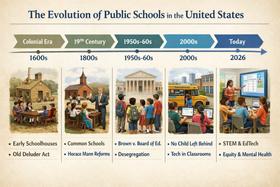Serving 426 students in grades Kindergarten-5, Badin Elementary School ranks in the top 30% of all schools in North Carolina for overall test scores (math proficiency is top 30%, and reading proficiency is top 30%).
The percentage of students achieving proficiency in math is 65% (which is higher than the North Carolina state average of 51%). The percentage of students achieving proficiency in reading/language arts is 56% (which is higher than the North Carolina state average of 50%).
The student-teacher ratio of 15:1 is equal to the North Carolina state level of 15:1.
Minority enrollment is 33% of the student body (majority Black), which is lower than the North Carolina state average of 57% (majority Black).
Quick Facts (2026)
- Grades: Kindergarten-5
- Enrollment: 426 students
- Student-Teacher Ratio: 15:1
- Minority Enrollment: 33%
- Overall Testing Rank: Top 30% in NC
- Math Proficiency: 65% (Top 30%)
- Reading Proficiency: 56% (Top 50%)
- Science Proficiency: 75-79% (Top 20%)
- Source: National Center for Education Statistics (NCES), NC Dept. of Education
Top Rankings
Badin Elementary School ranks among the top 20% of public schools in North Carolina for:
Category
Attribute
Science Proficiency
Percent Eligible For Free Lunch
School Overview
Badin Elementary School's student population of 426 students has declined by 5% over five school years.
The teacher population of 29 teachers has declined by 9% over five school years.
Grades Offered
Grades Kindergarten-5
(No virtual instruction)
(No virtual instruction)
Total Students
426 students
Gender %
Total Classroom Teachers
29 teachers
School Calendar
School Rankings
Badin Elementary School ranks within the top 30% of all 2,617 schools in North Carolina (based off of combined math and reading proficiency testing data).
The diversity score of Badin Elementary School is 0.52, which is less than the diversity score at state average of 0.71. The school's diversity has stayed relatively flat over five school years.
Overall Testing Rank
#729 out of 2617 schools
(Top 30%)
(Top 30%)
Math Test Scores (% Proficient)
(21-22)65%
51%
Reading/Language Arts Test Scores (% Proficient)
56%
50%
Science Test Scores (% Proficient)
75-79%
63%
Student-Teacher Ratio
15:1
15:1
American Indian
1%
1%
Asian
3%
4%
Hispanic
4%
21%
Black
15%
25%
White
67%
43%
Hawaiian
n/a
n/a
Two or more races
10%
6%
All Ethnic Groups
Participates in the National School Lunch Program (NSLP)
Yes
Eligible for Free Lunch
95%
68%
Eligible for Reduced Lunch (21-22)
2%
2%
School Statewide Testing
School District Name
Source: National Center for Education Statistics (NCES), NC Dept. of Education
Frequently Asked Questions
What is Badin Elementary School's ranking?
Badin Elementary School is ranked #729 out of 2,617 schools, which ranks it among the top 30% of public schools in North Carolina.
What schools are Badin Elementary School often compared to?
Badin Elementary Schoolis often viewed alongside schools like Aquadale Elementary School, Central Elementary School, Richfield Elementary School by visitors of our site.
What percent of students have achieved state testing proficiency in math and reading?
65% of students have achieved math proficiency (compared to the 51% NC state average), while 56% of students have achieved reading proficiency (compared to the 50% NC state average).
How many students attend Badin Elementary School?
426 students attend Badin Elementary School.
What is the racial composition of the student body?
67% of Badin Elementary School students are White, 15% of students are Black, 10% of students are Two or more races, 4% of students are Hispanic, 3% of students are Asian, and 1% of students are American Indian.
What is the student-teacher ratio of Badin Elementary School?
Badin Elementary School has a student ration of 15:1, which is equal to the North Carolina state average of 15:1.
What grades does Badin Elementary School offer ?
Badin Elementary School offers enrollment in grades Kindergarten-5 (No virtual instruction).
What school district is Badin Elementary School part of?
Badin Elementary School is part of Stanly County Schools.
School Reviews
Review Badin Elementary School. Reviews should be a few sentences in length. Please include any comments on:
- Quality of academic programs, teachers, and facilities
- Availability of music, art, sports and other extracurricular activities
Recent Articles

Do We Still Need Libraries in Public Schools in 2026
An updated look at the role of public school libraries in 2026, their impact on literacy, equity, and digital learning, and why they remain essential today.

The History of Public Schools in the United States
Explore the history of public schools in the U.S., from colonial roots to 2026 reforms shaping equity, funding, and classroom innovation.

Special-Program Registration Deadlines Explained
Learn what to know about special-program registration deadlines for magnet, CTE, and dual-enrollment options in public schools.





